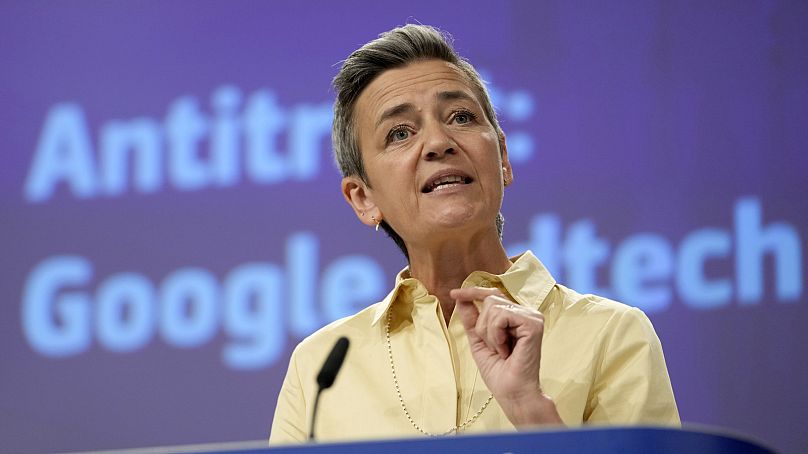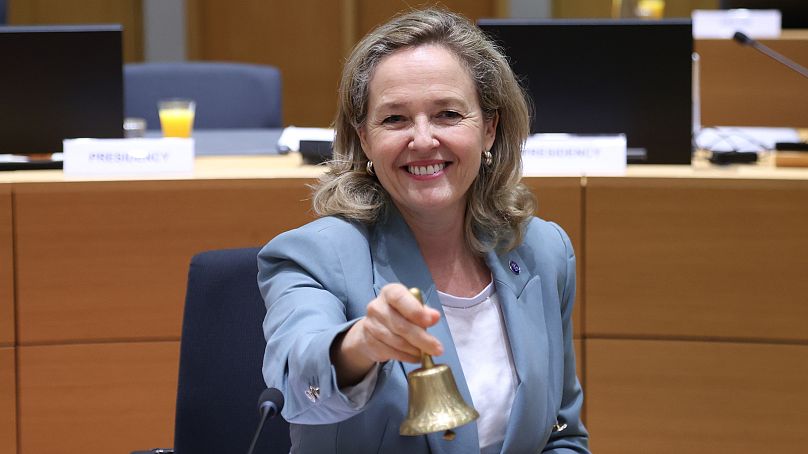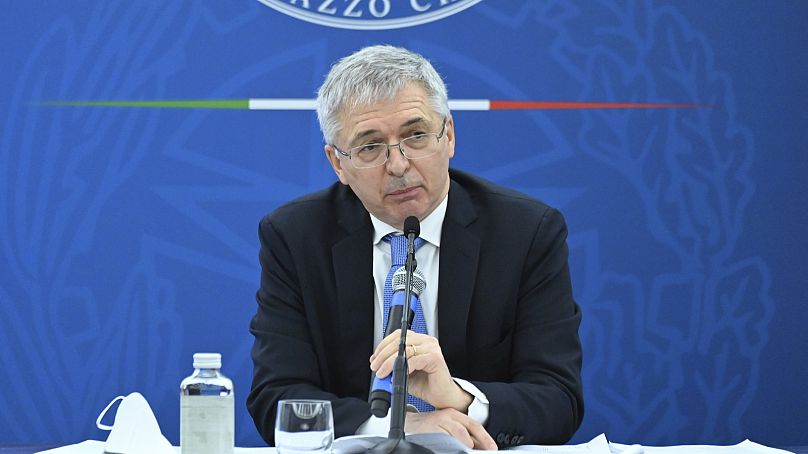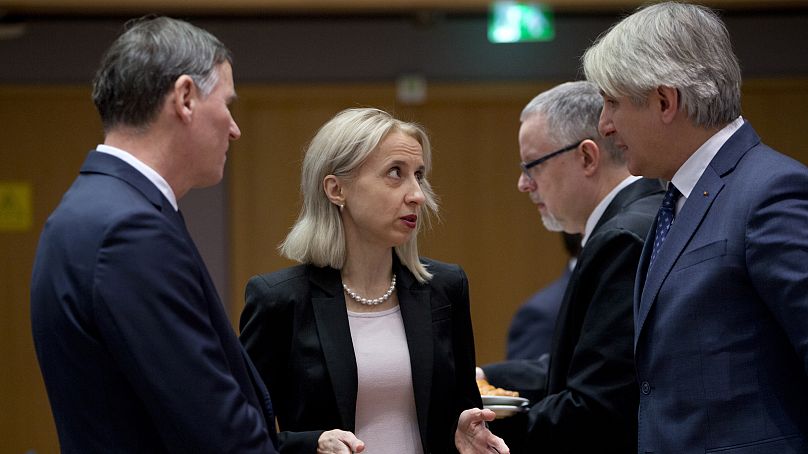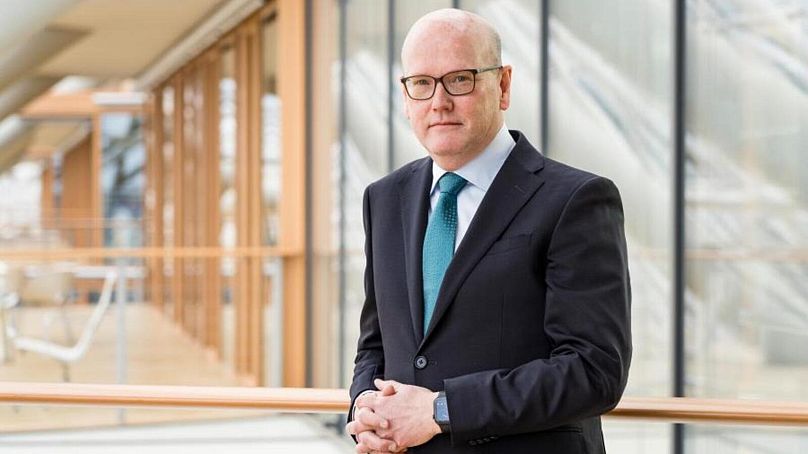Five candidates have thrown their hats into the ring to be the next President of the European Investment Bank (EIB).
The successful applicant will lead the world’s biggest multilateral financier as it prepares to fund the reconstruction of Ukraine and crucial investments in climate action.
 ADVERTISEMENT
ADVERTISEMENT
 ADVERTISEMENT
ADVERTISEMENT
Spain's finance minister Nadia Calviño and the EU's antitrust chief Margrethe Vestager are tipped as favourites.
All eyes are now on EU finance ministers, who will discuss candidates’ bids when they gather on Friday in Santiago de Compostela, Spain, before casting their vote during an EIB board meeting expected in the coming weeks.
France and Germany, whose votes have the most weight, are yet to back a candidate.
A pending appointment to the other of the bloc's major financial institutions, the Frankfurt-based European Central Bank (ECB), could prove critical in tipping the odds for or against Calviño.
Spain’s Margarita Delgado and Germany’s Claudia Buch are shortlisted to chair the ECB’s supervisory arm - but a Delgado appointment could block the path to the EIB for Calviño, as EU countries horse-trade over top jobs.
Euronews brings you the rundown of the candidates.
Margrethe Vestager
Not your usual Brussels bureaucrat, Vestager has gained a global reputation as the thorn in Big Tech’s side. During her nine years as the EU’s antitrust chief, she has slapped hefty fines on the world’s biggest companies for abusing their market dominance.
The Danish liberal is taking unpaid leave from the European Commission to make her EIB Presidency bid, with Commissioners Didier Reynders and Věra Jourová stepping in to cover her competition and digital portfolios.
Vestager has said she would take "more risks" in the role, arguing decisions need to be accelerated so the bank can fund Ukraine’s reconstruction while the war wages on.
"I am looking for a mandate from the governance of the bank for it to be faster and in doing so can be even more relevant," she told the Financial Times.
Despite their common political family backing her candidacy, Vestager is unlikely to secure the support of the French president. She was recently forced to withdraw the appointment of an American as chief economist of her competition department following backlash from Emmanuel Macron, a long-time critic of US Big Tech’s unchecked influence on the EU.
In 2019, Vestager’s decision to block a rail merger between France’s Alstom and Germany’s Siemens also ruffled feathers in the Elysée.
In a further indication Paris will not back Vestager, France’s EU Commissioner Thierry Breton indicated on Wednesday that the EIB should finance nuclear energy in Europe, something Vestager is unlikely to support.
Nadia Calviño
Widely considered in the pole position is Spanish Finance Minister Nadia Calviño.
She has said that the EIB has an increasingly important role given the current high interest rates and the urgent need for more green investments.
Formerly director-general of the European Commission’s budget and competition departments, Calviño made the move from Brussels to Madrid in 2018 to be Pedro Sánchez’s economic affairs minister and has since moved up the government ranks.
She’s seen as a safe pair of hands, having guided Spain’s economy through the COVID-19 crisis and the economic turmoil following Russia’s invasion of Ukraine. She has also chaired the International Monetary Fund (IMF)'s financial committee since 2021.
But Calviño has a record of narrowly missing out on top jobs. She unexpectedly lost her bid for the Eurogroup Presidency to Ireland’s Pascal Donohoe in 2020 and withdrew from the race to head the IMF in 2019.
Calviño has the advantage of hosting the bloc's finance ministers - who have the final decision on the appointment - next week on her home turf in Galicia.
Daniele Franco
Italy's candidate is Daniele Franco, Mario Draghi’s former finance minister.
He also worked at the European Commission early in his career as an economic advisor, before returning to work in banking in Italy. After serving in Draghi's cabinet, he became head of Italy's central bank.
Franco recently denied reports that Giorgia Meloni had re-considered his nomination, assuring that he is the government’s official candidate.
“The EIB plays an important role for European countries and it will be even more important in the future, regardless of who fills the role,” he said.
Italy hopes Franco can emerge as an underdog if there is a lack of majority support for Calviño or Vestager.
Teresa Czerwińska
The third woman in the race is Poland’s Teresa Czerwińska, who currently serves as one of the EIB’s vice presidents. She oversees the EIB’s operations in Ukraine and has called on the EU to rapidly proceed with funding the country’s reconstruction as the war continues.
“Even as the war grinds on, reconstruction funds must flow. Because recovery can’t wait. Because the people can’t wait,” Czerwińska said in May.
Czerwińska was Poland’s finance minister until she was dismissed in a 2019 cabinet reshuffle after expressing scepticism over her Law and Justice government’s social spending programmes.
Her appointment would mark a turning point in the bloc's long tradition of appointing Western European leaders to top financial roles.
Thomas Östros
Sweden has fielded current EIB vice-president Thomas Östros.
Born in a small town over 1,000 km north of Stockholm to an explosives worker and a housewife, he was an active social democrat in his youth and became a member of the Riksdag in 1994.
He brings experience in government, having served as the Swedish minister of fiscal affairs, education and industry in various governments between 1996 and 2004, before moving on to hold posts in the Swedish Bankers' Association and the IMF.
Östros is a vocal advocate for green investments and a strong supporter of the EIB's landmark decision to stop funding fossil fuel projects at the end of 2021.











